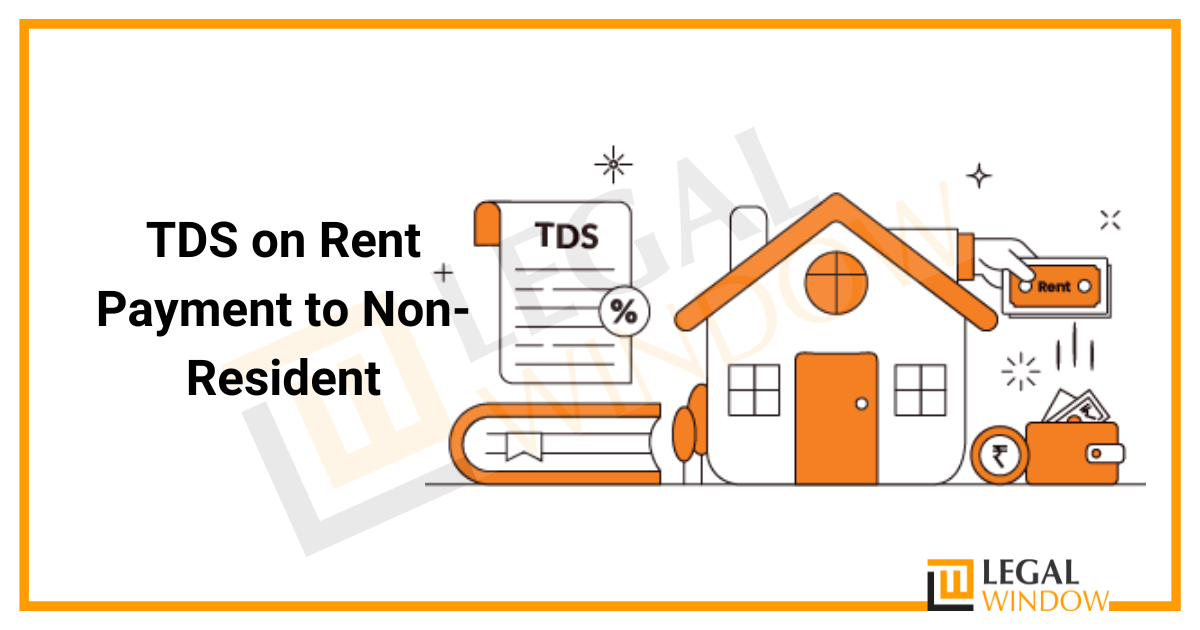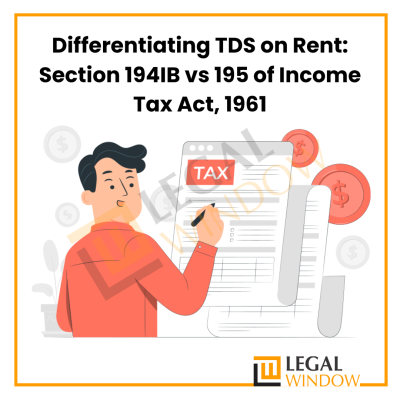 TDS was designed to collect tax directly from the source of revenue. According to this theory, a person (deductor) who is compelled to make a certain payment to another person (deductee) must deduct tax at the source and deposit it in the account of the Central Government. The deductee whose income tax has been deducted at source is entitled to a credit for the amount thus deducted based on the deductor’s Form 26AS or TDS certificate. But before we shall move on to discuss TDS on Rent Payment to Non-Resident, let us first discuss Tax Deducted at Source, so that we can have a better understanding of the concept.
TDS was designed to collect tax directly from the source of revenue. According to this theory, a person (deductor) who is compelled to make a certain payment to another person (deductee) must deduct tax at the source and deposit it in the account of the Central Government. The deductee whose income tax has been deducted at source is entitled to a credit for the amount thus deducted based on the deductor’s Form 26AS or TDS certificate. But before we shall move on to discuss TDS on Rent Payment to Non-Resident, let us first discuss Tax Deducted at Source, so that we can have a better understanding of the concept.
Meaning of Tax Deducted at Source
TDS (Tax Deducted at Source) is a percentage of a payment deducted at the time of payment, such as a salary, commission, rent, interest, or professional fees. The person who makes the payment deducts tax at the source, but the person who receives the payment/income owes tax. It lowers tax evasion because the tax is collected at the time of payment.
Tax deduction at source is a method of collecting tax on income, dividends, or asset sales prior to filing an income tax return by forcing the payer to subtract tax owed and the payee’s income before transferring the amount to the payee. In India, income tax must be deducted at source in accordance with the rules of the Indian Income Tax Act, 1961.
Legal Window will assist you in filing your TDS Return on time so that your employees and those who have had TDS deducted may enter the correct information on their form 26AS. For TDS Working, please contact our staff at 072407-51000 or admin@legalwindow.in.
When and by whom is Tax Deducted at Source Deducted?
Tax Deducted at Source shall be deducted for the following:
- TDS will be deducted at the time of any payment that falls under the scope of the Income Tax Act.
- No TDS would be deducted and your records will not be audited if you are a person or a Hindu Undivided Family (HUF).
- Even if your books are not audited, a TDS of 5% will be deducted if you pay rent as a person or as a member of a HUF and the amount payable exceeds Rs.50, 000.
- If you need TDS deducted at the 5% rate, you do not need to apply for a Tax Deduction Account Number (TAN).
- If you work, your employer will deduct TDS based on the appropriate income tax slab rates.
- The bank with whom you have a working account will deduct TDS at a rate of 10%. If they do not have your PAN data, TDS in the amount of 20% will be deducted.
- For the bulk of payments, TDS rates are specified by the Income Tax Act, and the payer deducts TDS based on the rates.
- You will not be required to pay any tax if you provide your investment evidence to your employer and your total taxable income is less than the entire taxable threshold. As a result, no TDS is deducted in this case.
- If you failed to provide investment proof to your employer and the bank deducted TDS, you can submit a return and receive a refund if your total taxable income is less than the total taxable limit.
Online Tax Deducted at Source Filing Procedure
Before you file your TDS return, there are a few items you should check. The specifics are as follows:
- For e-filing, make sure you have a current Tax Deduction and Collection Account Number (TAN).
- Prepare your TDS statements using the Return Preparation Utility before confirming them with the File Validation Utility.
- You must have a valid Digital Signature Certificate that is registered for e-Filing if you wish to utilize DSC to upload your returns.
- To upload your returns using the e-Verification Code, supply your primary contact’s Demat or bank account information, or ensure his/her PAN is linked to his/her Aadhaar.
Penalty for late payment of Tax Deducted at Source
The Income Tax Department applies the following fines for failing to submit or failing to file your TDS return/statements:
- Failure to file returns: Under Section 272A (2) of the Income Tax Act, a penalty of Rs.100 would be imposed for each day that the returns are not filed, up to the TDS amount.
- Failure to timely file your returns: Section 234E of the Income Tax Act imposes a penalty of Rs.200 for each day that the returns remain blank, up to the TDS amount.
- Section 271H of the Income Tax Act imposes a penalty of Rs.10, 000 to Rs.1 lakh if the deductor fails to file the TDS return by the due date.
- If the deductor gives inaccurate information about his or her PAN, TDS amount, and so on. Section 271H of the Income Tax Act would levy a penalty ranging from Rs.10, 000 to Rs.1 lakh.
- If a taxpayer fails to pay TDS by the due date, interest will be assessed in addition to the penalty.
- If a portion or all of the tax is not deducted at the source, a monthly interest rate of 1.5 percent will be levied from the day the tax was deductible until the date the tax is actually deducted.
TDS Certificate
TDS certifications come in two varieties: Form 16 and Form 16A.
- Section 203 of the Income Tax Act, 1961 requires the department to issue a certificate to the deductee. The deductor must give this form to the deductee.
- Employers must send Form 16 to salaried workers, which must detail the amount deducted as TDS. Form 16 includes the computation of tax, deduction of tax, and payment of TDS. Employers must distribute this form to their employees by May 31 of the next fiscal year.
- The deductor provides Form 16A, which contains information on computation, TDS deduction, and payments.
TDS on Rent Payment to Non-Resident
In some cases, Indian taxpayers must deduct tax from the rent they pay to their landlords, deposit it to their PAN, and send a document to the landlord detailing the tax deducted and the rent paid. Non-resident Indians (NRIs) buy property in India and rent it out. Is the regulation applicable to rent paid for NRI-owned properties?
- TDS Provisions When Renting an NRI Property: The regulations for tax deduction at source on rent paid in India were revised in Budget 2017. Tenants paying rent on NRI-owned homes must subtract 31.2% tax at the source and report the whole amount to the tax authorities. Following payment, the renter must complete Form 15CA and submit it to the Income Tax Department online. TDS is required on the rent paid in this scenario, regardless of the amount payable.
- Applicable tax rates for NRI: The tax of 31.2% must be deducted from the rent payable. Unless the NRI landlord obtains a certificate confirming that his entire income from India is less than the exemption level, this tax rate applies. A certificate under Section 197 for reduced TDS received under Section 197 would obligate the deductor to deduct lesser TDS in accordance with the AO’s ruling.
- TDS Tax Deduction in case of NRI: Tenants must first get a tax account number (TAN) through the NSDL Website. Once the TAN is obtained, the renter can deduct tax every month and pay the balance to the landlord.
The tax deducted at source from this calendar month’s rent must be paid by the seventh of the next calendar month. TDS must be paid on time. Otherwise, it is punishable under Section 276B of the Income Tax Act, 1961. That is, it may result in imprisonment for three months to seven years.
If you fail to deduct tax from the rent paid to an NRI landlord, you may face a penalty equivalent to the amount of tax not deducted under Section 271C of the Income Tax Act, 1961; prosecution is not permitted in this instance.
Other information regarding TDS on Rent Payments to Non-Resident
Every time rent is paid, tenants must complete Form 15CA on the Income Tax Portal. If the tenant’s total annual rent exceeds Rs.5 lakh, he or she must get Form 15CB from a Chartered Accountant.
It is your obligation to determine whether the landlord is an NRI before renting a home. This makes it simple for you to deduct TDS on rent paid and comply with the Income Tax Act, of 1961. Maintain a record of any changes to the tax regulations.
 Takeaway
Takeaway
If the interest paid on the home loan exceeds the rent earned during a certain assessment year, it can be adjusted against income from other sources, just like it is for resident Indians. The “loss” under income from residential property can be carried forward for up to 8 years and offset against income from other sources in subsequent assessment years.
Regardless of whether money was made via rent or not during a certain assessment year, NRIs must submit Income Tax Returns within the deadlines. The NRI’s rent should only be credited to the NRO account. It may only be credited to the NRE account if the payer is likewise an NRI making the payment with his/her NRE account.
If the NRI chooses to collect the rental income through remittance, he or she should get a certificate from a Chartered Accountant confirming that all applicable taxes have been paid and that there is no additional tax liability. In the ITR, the NRI must include revenue from all sources, as well as TDS from rental income.
CA Pulkit Goyal, is a fellow member of the Institute of Chartered Accountants of India (ICAI) having 10 years of experience in the profession of Chartered Accountancy and thorough understanding of the corporate as well as non-corporate entities taxation system. His core area of practice is foreign company taxation which has given him an edge in analytical thinking & executing assignments with a unique perspective. He has worked as a consultant with professionally managed corporates. He has experience of writing in different areas and keep at pace with the latest changes and analyze the different implications of various provisions of the act.
Categories
- Agreement Drafting (23)
- Annual Compliance (11)
- Change in Business (36)
- Company Law (148)
- Compliance (90)
- Digital Banking (3)
- Drug License (3)
- FEMA (17)
- Finance Company (42)
- Foreign Taxation (6)
- FSSAI License/Registration (14)
- GST (120)
- Hallmark Registration (1)
- Income Tax (202)
- Latest News (34)
- Miscellaneous (165)
- NBFC Registration (8)
- NGO (14)
- SEBI Registration (6)
- Section 8 Company (7)
- Start and manage a business (21)
- Startup/ Registration (130)
- Trademark Registration/IPR (40)
Recent Posts
About us
LegalWindow.in is a professional technology driven platform of multidisciplined experts like CA/CS/Lawyers spanning with an aim to provide concrete solution to individuals, start-ups and other business organisation by maximising their growth at an affordable cost.








